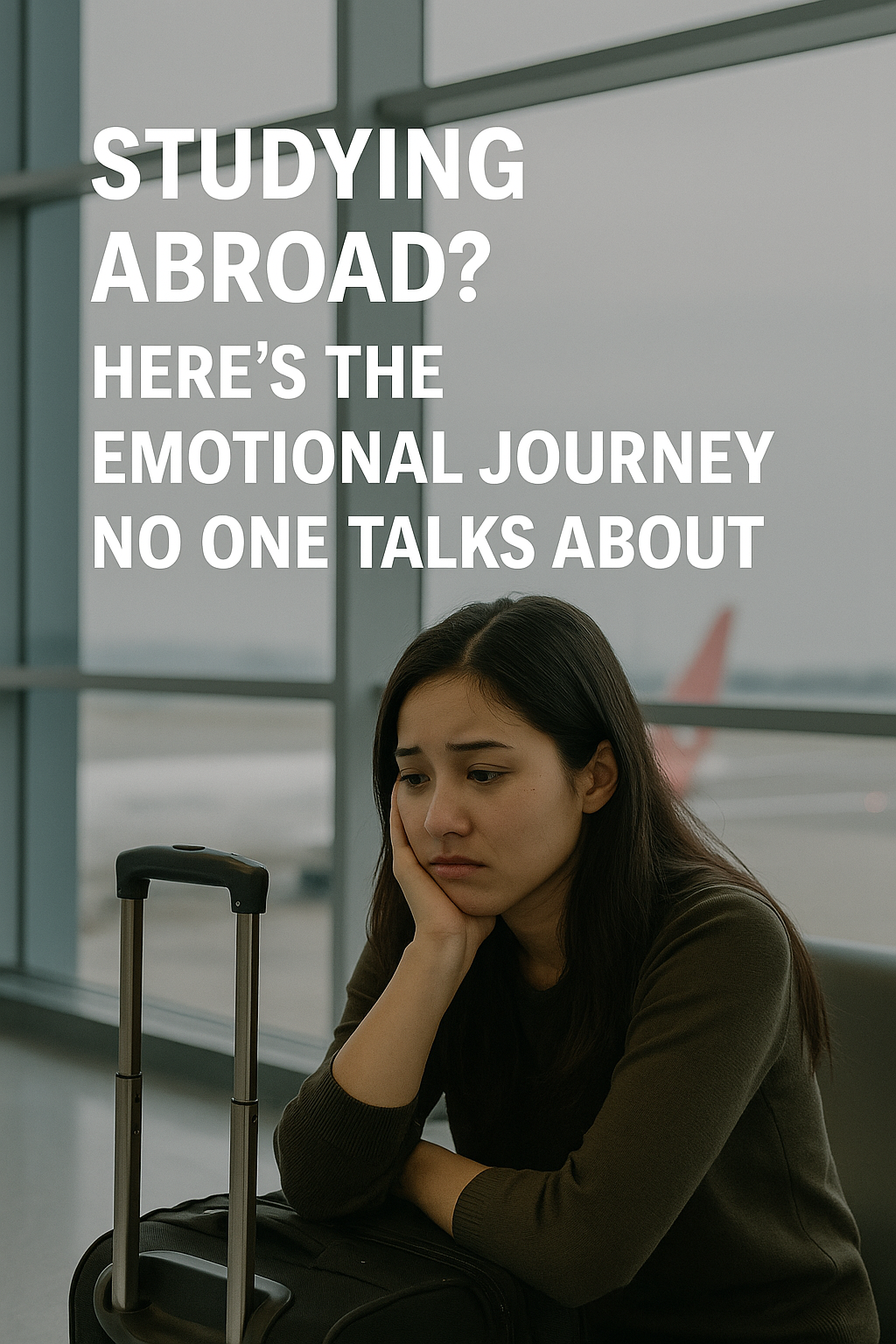Call Us:+91-9920234749, +91-9833420909 info@studyandworkabroad.in

Studying Abroad? Here’s the Emotional Journey No One Talks About
Studying abroad is often marketed as a dream filled with travel, new friendships, and academic success. But beneath the Instagram-worthy experiences lies a lesser-discussed reality — the emotional rollercoaster students go through when living in a new country.
From the moment you land to the day you pack up and return home (or move on to new adventures), the emotional transition can be intense, complex, and life-changing.
If you’re planning to study overseas, especially as an Indian student, it’s important to understand the phases of emotional adjustment you might experience. This guide offers honest insights and practical tips to help you thrive through every high and low.
1. The Honeymoon Phase – Euphoria and Exploration
As your plane touches down in a new land, you’re filled with energy and excitement. Everything feels fresh and full of possibility. From the architecture and public transport to local cuisine and academic culture — every day feels like a new adventure.
You’ll likely:
- Take photos of everything
- Try new foods
- Eagerly explore your new city
- Feel optimistic about your future
2. Culture Shock – When Reality Sets In
After the initial thrill, things start to feel overwhelming. You realise you’re not on vacation — this is real life now. You might struggle with accents, new academic expectations, unfamiliar foods, or cultural etiquette that feels alien.
Signs of culture shock may include:
- Feeling isolated or out of place
- Difficulty communicating effectively
- Frustration with everyday tasks
- Missing the comfort and predictability of home
3. Homesickness – Missing the Familiar
This is often the most emotional stage, especially for Indian students used to close-knit family structures. During festivals like Diwali or Holi, or even on regular days when you crave “maa ke haath ka khana,” a wave of nostalgia can hit hard.
Common experiences:
- Longing for home-cooked meals
- Missing family and friends
- Feeling like you don’t belong
- Emotional ups and downs
4. The Adjustment Period – Learning to Settle In
Gradually, routines start to form. You figure out your class schedule, your grocery store runs become easier, and you may even navigate public transport like a local. The culture doesn’t feel as alien anymore.
You’ll start to:
- Feel more confident and independent
- Build friendships beyond your home country circle
- Discover local spots you love
- Understand how to balance academics and life
5. Personal Growth – Becoming a Global Citizen
By the end of your study abroad journey, you won’t be the same person who nervously boarded the flight months ago. The emotional ups and downs will have shaped you in ways textbooks never could.
You will have:
- Improved problem-solving and cross-cultural skills
- Greater resilience and self-confidence
- A more global, open-minded perspective
- A deeper understanding of who you are
6. Re-Entry Shock – Returning Home Isn’t Always Easy
Many students aren’t prepared for this phase. After building a life abroad, returning to India (or moving elsewhere) can bring another emotional wave. You may feel out of sync with old friends or struggle to readjust to your home culture.
This might look like:
- Feeling disconnected at home
- Reverse culture shock
- Craving the independence you had abroad
- A desire to return or travel again
7. How to Emotionally Prepare Before You Go
While each student’s emotional journey is unique, preparing in advance can help smooth your transition.
Here are some ways to be mentally and emotionally ready:
- Research your destination: Understand cultural norms, local laws, and social behaviors.
- Learn the basics: Try to pick up simple words or phrases in the local language.
- Talk to alumni: Connect with past students to hear real-life stories and advice.
- Set realistic expectations: Not every day will be exciting — and that’s okay.
- Create a digital support network: Keep WhatsApp groups or Discord servers with family and friends back home.
8. Coping Strategies That Actually Work
Here are proven methods to manage emotional stress while studying abroad:
| Strategy | Why It Helps |
| Join campus clubs | Builds friendships and social support |
| Exercise regularly | Reduces anxiety and boosts mood |
| Practice mindfulness | Helps stay grounded and present |
| Stay organized | Lowers stress and builds structure |
| Celebrate small wins | Boosts motivation and confidence |
9. When to Seek Help
While feeling sad or confused occasionally is normal, persistent anxiety, depression, or loneliness should not be ignored.
Reach out if you:
- Are constantly withdrawn
- Have trouble sleeping or eating
- Experience panic attacks or emotional numbness
- Feel helpless or hopeless for extended periods
Tip: Most universities abroad offer free or low-cost mental health support. Use it — there’s no shame in asking for help.
Conclusion: Studying Abroad Is a Life-Altering Journey
Studying abroad isn’t just about academics. It’s an emotional journey filled with ups, downs, learning curves, and unforgettable moments. As an Indian student navigating a new world, the experience will challenge you — but it will also transform you.
By acknowledging the emotional side of this journey, preparing in advance, and staying connected to both old and new support systems, you can not only survive but truly thrive abroad.
So go ahead — take the leap. And when the emotional rollercoaster begins, remember: you’re not alone.
FAQs: Emotional Journey of Studying Abroad
Q1. Is it normal to feel lonely while studying abroad?
Yes, absolutely. Almost every student goes through periods of loneliness, especially in the early months. Building a social circle and staying in touch with loved ones helps.
Q2. What can I do when I feel homesick?
Cook familiar meals, listen to music from home, talk to your family regularly, and engage with students from your own and other cultures.
Q3. Can studying abroad impact my mental health?
Yes. While it offers growth, it can also cause stress. Regular self-care and reaching out for help when needed is important.
Q4. How long does it take to adjust emotionally after moving abroad?
It varies, but most students begin to adjust within 2–4 months. Full cultural adaptation may take 6 months to a year.
Q5. Is it okay to miss home even after a year abroad?
Absolutely. Missing home is a sign of love and connection, not weakness. It’s possible to love your new home while still missing the old one.
Need expert help to prepare emotionally and academically for your overseas education journey?
Connect with our experienced study abroad consultants at Study and Work Abroad today. We don’t just help you get in — we help you fit in.



